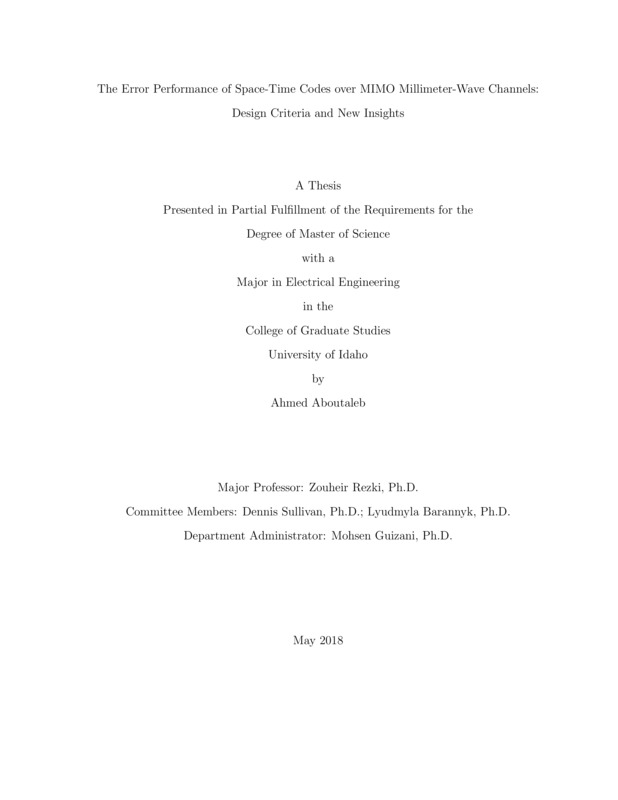The Error Performance of Space-Time Codes over MIMO Millimeter-Wave Channels: Design Criteria and New Insights
Aboutaleb, Ahmed. (2018-05). The Error Performance of Space-Time Codes over MIMO Millimeter-Wave Channels: Design Criteria and New Insights. Theses and Dissertations Collection, University of Idaho Library Digital Collections. https://www.lib.uidaho.edu/digital/etd/items/aboutaleb_idaho_0089n_11363.html
- Title:
- The Error Performance of Space-Time Codes over MIMO Millimeter-Wave Channels: Design Criteria and New Insights
- Author:
- Aboutaleb, Ahmed
- Date:
- 2018-05
- Keywords:
- Blockage Millimeter Wave MIMO Nakagami Fading Space-time Coding Wireless Communication
- Program:
- Electrical and Computer Engineering
- Subject Category:
- Electrical engineering
- Abstract:
-
In this thesis, the error performance limits of millimeter-wave (mm-wave) communication systems are considered.
To derive such performance limits, an accurate statistical channel model must be developed. We argue that the Nakagami-$m$ distribution accurately models the statistics of small-scale fading at mm-wave frequencies and provide extensive numerical simulations for the indoor environment at 60 GHz.
Then, we derive an upper bound on the error performance of any space-time coding scheme that well-describes the diversity and coding gains. Our upper bound is based on the pairwise error probability. We then examine the resulting diversity and coding gains to propose design criteria that maximize the diversity and coding gains. Orthogonal space-time block codes are shown to achieve the maximum diversity gain but not the maximum coding gain. Indeed, we show that there exists a trade-off between the diversity gain and the coding gain. Furthermore, we investigate the effect of blockage on the error performance using stochastic geometry. Our analysis and simulations show that blockage only reduces the coding gain and does not affect the diversity gain. This reduction in the coding gain is a function of the probability of line-of-sight communication, path loss exponents, the distance between transceivers, and the coding gain without considering the effect of blockage. For instance, in a typical indoor environment for mm-wave communication, blockage due to humans or other obstacles can reduce the coding gain by up to 1.5 dB for a bit error probability of 10$^{-3}$.
- Description:
- masters, M.S., Electrical and Computer Engineering -- University of Idaho - College of Graduate Studies, 2018-05
- Major Professor:
- Rezki, Zouheir
- Committee:
- Sullivan, Dennis; Barannyk, Lyudmyla
- Defense Date:
- 2018-05
- Identifier:
- Aboutaleb_idaho_0089N_11363
- Type:
- Text
- Format Original:
- Format:
- application/pdf
- Rights:
- In Copyright - Educational Use Permitted. For more information, please contact University of Idaho Library Special Collections and Archives Department at libspec@uidaho.edu.
- Standardized Rights:
- http://rightsstatements.org/vocab/InC-EDU/1.0/

